Landscapes were well maintained before gas-powered leaf blowers took over American towns, and in cities that have banned these machines, landscapes are still well maintained. Many pro landscapers know they’re not a necessary tool, and by using clean alternatives to leaf blowers in their clients’ yards, they’re cultivating thriving landscapes with just as much curb appeal, but also richer soil, healthier ecology, and less need for watering and fertilizer.
Bottom line–these clean alternatives produce better results and healthier neighborhoods.
“…Battery technology has finally advanced to the point where we’re confident we can make this switch without sacrificing the power we need or the durability we rely on.”
– Justin White, CEO, K&D Landscaping
“Landscaping used to be more than scorched earth cleanup.”
– Jamie Banks, founder of Quiet Communities
On this page:
Ditch Leaf Blowers
Best Practices
Battery Leaf Blowers?
LEEP Program for Discounted Battery Equipment
Pros and Cons of Battery Leaf Blowers
Costs of Gas vs. Battery Blowers–Which is Truly Cheaper?
List of Local Clean Air Landscapers
Resources for Landscapers and Homeowners
Ditch Leaf Blowers
Take the pledge not to use leaf blowers, for the sake of your neighbors and the health and environment of Santa Cruz.
And if you hire a company to maintain your landscape, tell them you’d like them to switch to battery-powered or not to use any leaf blowers at all. We’ve made this easy! We’ve written a letter you can customize and send to the owner or manager of your landscape company, or to your HOA: see Greening your Landscape Company.
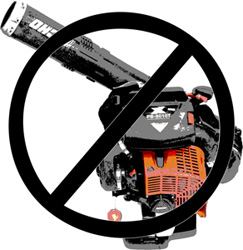
For most properties, rakes and brooms do the job nearly as fast. And–here’s a secret–a lot of what passes for clean-up work can be skipped. Landscapes that mimic English country estates. shorn of nature’s leaves and insects, are out of favor in California, and there’s growing appreciation of functional gardens which don’t cost extra in water, fertilizer, and time. If your landscape company tells you it’s not possible, remember, they work for you, and you can mention there other landscape companies that are happy to work this way.
If you must blow the leaves and all that goes with them, check out battery leaf blowers–they’re as capable as the old gas blowers, cheaper to operate, and much cleaner and quieter. Better yet, get an electric vacuum (or blower with a vacuum mode)–it’ll shred the leaves for you, so they’re easier to use as mulch, and it won’t kick up dirt and toxins from soil and pavement.
And ask your neighbors to do the same–they may not even know their landscape company is using gas-powered blowers.
Best Practices
Moving beyond gas leaf blowers doesn’t need to cost more money. Many properties can be maintained with manual tools in a similar amount of time, and many battery leaf blowers today are as capable as most gas blowers, and cost less to power and maintain.
First decide which surfaces you want clearing. Some landscape companies come through with a leaf blower and blow everything in sight, by default. That’s unnecessary, and it’s bad for your plants and soil. If your landscaper thinks raking and sweeping will take more time, consider asking them to clear just the paths and driveway weekly and the softscapes (lawns and plantings) every other week. Or mulch those leaves or just leave them to replenish the soil (see below).
If your property is too large for manual tools, and you can’t reduce the scope of the leaf collection to save time, and you must blow the leaves and soil all over the place (that’s a lot of ifs), see the section on battery leaf blowers below.
Here are some ways to reduce the time spent on clearing and sweeping, while reaping the benefits that backyard nature offers for free.
- Leave leaves where they are, around shrubs and plants
- They act as a natural mulch, providing critical nutrients to the soil, helping suppress weeds, and providing cover for beneficial critters and insects
- A natural leaf cover fertilizes the soil and holds moisture, reducing the need for fertilizer and watering
- Mulch leaves in place (mowing leaves with a mulching mower or mulching blades)
- Provides all the benefits of leaving leaves where they are, but “mulching in place” turns them into tiny shreds, speeding the process
- Perfect for lawns for a “tidier” look without using a blower
- Add leaves to your compost pile, and add the finished compost to your garden
- Or just rake leaves into a pile in the corner of your yard; a simple wire enclosure will prevent the wind from blowing them away
- Adding sticks and branches to the pile provides extra shelter for local wildlife
Battery Leaf Blowers?
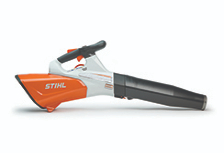
When ditching gas-powered leaf blowers, it’s tempting to just switch to battery ones and do everything the same as before. But there are heavy impacts from using any leaf blower, gas or battery–they disperse soil, mulch, and ground toxins, disrupt local habitat, and result in greater water and fertilizer needs. But if you’re going to use a leaf blower, battery-powered ones are the clear winner.
The technology has come a long way in the last few years, and battery leaf blowers are now as capable and affordable as gas ones for most jobs. Actually, they start saving money right away, because the gas and maintenance costs for gas-powered machines are high. Plus, many companies have a whole line of battery tools which use the same type of battery, so you can easily drop the same battery into a leaf blower, string trimmer, edger, even a chain saw, making it easier than ever for landscapers to upgrade their entire line of power tools.
Take a look at the pros and cons below.
Electric Leaf Vacuums suck up leaves and shred them before sending them into the attached bag, so they don’t blow away the soil or disperse all those nasty particulates that leaf blowers–whether gas or battery–do. And bonus–shredded leaves take up less space in your green bin or compost pile, and even better, you can use them as mulch around your plants. (Many battery leaf blowers have a vacuum setting).
LEEP Program for Discounted Battery Equipment
Effective July 1, 2025, landscapers are no longer allowed to use gas-powered leaf blowers in Santa Cruz. But transitioning to battery-powered blowers and other equipment is easy–and cheap!
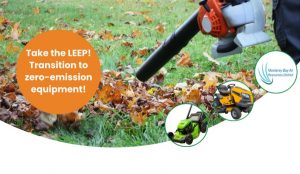
The LEEP trade-in program provides landscapers with battery-powered blowers and extra batteries at 80% off.
And once they make the switch, landscapers will start saving money right away by not buying gasoline. So operating expenses go down and profits go up. More on this below.
Pros & Cons of Battery Leaf Blowers
Pros
- Emits no hydrocarbons, toxins, or carcinogens
- Electricity must be produced to charge batteries, but the power that flows through most grids is much cleaner than what 2-stroke engines produce, and getting cleaner all the time
- They are generally about half as loud as gas blowers (though a few models are just as loud)
- Cost less to run–no more buying, transporting, and spilling gas and oil, and they’re much cheaper to maintain
- More comfortable–and much safer–for the operator. Low vibration and no fumes to breathe
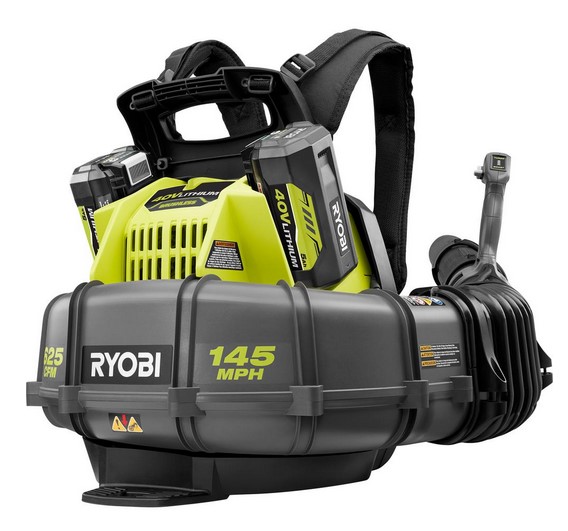
Cons
- As with gas blowers, the high winds disperse dust, chemicals, pesticides, fertilizers, and fecal matter from soil and surfaces towards other people’s houses, yards … and lungs
- As with gas blowers, they can blow away needed soil and organic matter, and displace beneficial insects and critters
- The lithium required for batteries comes primarily from just two regions, and extraction has high environmental costs
- Recycling lithium-ion batteries is not currently very cost effective, but this is likely to change
If you do decide to go electric, here are links to manufacturers’ websites for cordless (battery) leaf blowers and other electric landscape equipment (via CA Air Resources Board).
“Switching to battery-powered blowers and weed whips was the best thing I could have done for my workers.”
-Arturo Valdivia, Public Services Supervisor, City of Coronado
Costs of Gas vs. Battery Blowers–Which is Truly Cheaper?
Proposals to end the use of gas-powered leaf blowers often raise understandable concerns among landscapers about the cost of switching to electric. After all, the batteries aren’t cheap, and you may need two or three to make it through a full day of jobs.
Switching to battery leaf blowers is an up-front cost, but the operational costs of gas blowers are much higher than that of battery ones–the gas and oil they burn is much more expensive than the electricity used by a battery blower. So battery blowers cost less to use, day in, day out, than gas blowers. And here’s the best part–battery equipment fully pays for itself in about 10 months, and every day after that brings in higher profits for landscapers who have switched.
We ran the numbers ourselves, finding battery blowers of equal power to gas ones and tallying the cost of equipment and operation. The chart below compares the cumulative cost of sticking with a gas blower (in this case, a 459 CFM Husqvarna) or switching to a comparable battery blower. The green line shows the up-front cost of buying the battery blower (Year 0), including enough batteries to get through the day, plus charger, etc. Over time, the ongoing cost barely rises over the 5 years since it costs so little to recharge batteries. It rises a little after Year 3 to reflect the cost of replacing the batteries, but they usually last longer. The red line is the gas blower, which needs expensive fuel and oil, every day. In 10 months it’s already burned through $810 of gas and other inputs, and continues to burn gas, oil, and money. That same money could have bought new battery equipment, and would have gone on to deliver fatter profits every year going forward–in fact, $858 more, per blower, per year.
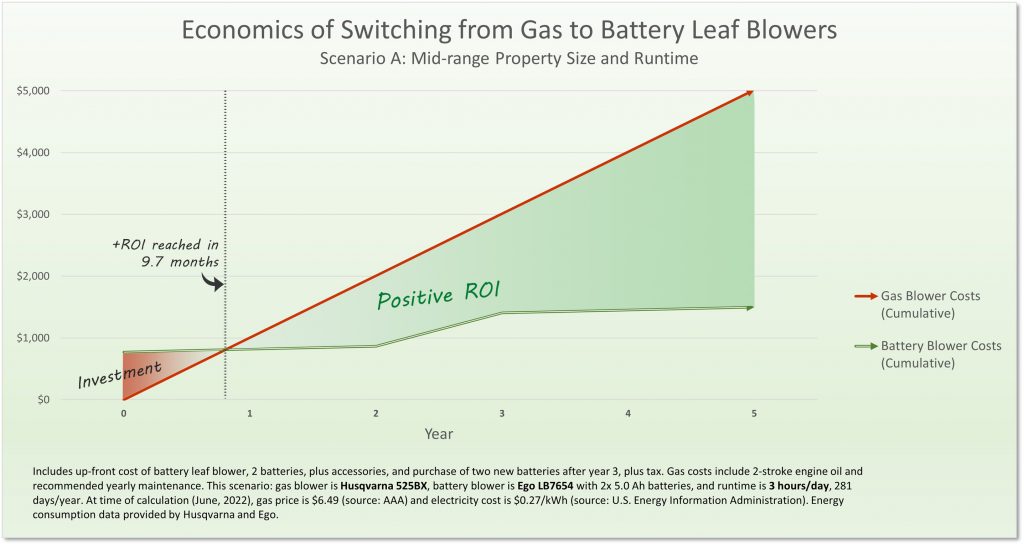
We also compared equipment with longer runtimes, a Stihl BR 500 (gas) and a Stihl BGA 200 with backpack battery that runs for 5 hours. In this scenario, ROI is achieved in about 10 months as well, and the battery blower goes on to save over $2,500 every year.
Even if the current high gas prices don’t last, the economics of switching to battery blowers remain very strong. If gas prices somehow dropped by 40% tomorrow, it would only extend the time to ROI by about four months. And the price and longevity of batteries continue to get better all the time.
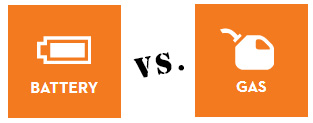
New: Stihl just came out with an online calculator. Just enter your local prices for gas and electricity and a few other variables, and see how fast the investment in battery power pays for itself and how much money you’ll be saving every year:
Stihl battery power savings calculator
Local Clean-Air Landscapers
If your current landscapers use gas-powered leaf blowers, kindly ask them to use manual tools or battery-powered blowers instead. Most have long known that cities are moving to curb gas-powered landscape equipment and have had time to plan for it. Customer demand helps incentivize landscapers to make the switch.
Remember, you’re hiring them, and you’re responsible for what’s produced on (and dispersed from) your property. If your landscaper insists on using gas-powered blowers, consider hiring one of the companies below. They all have agreed to not use gas-powered leaf blowers, either by customer request or as their general practice. This list is always growing, so if you’re aware of (or the owner of) a licensed landscaping company we should add to this list, please let us know. And if you own or manage a landscaping company and would like to be included on this list, please fill out our short survey. C.H.A.S.E. is an organization of volunteers and we do not endorse any specific companies; this is for informational purposes only.
| Company | Offers Electric/Battery Leaf Blowing | Offers No-Blow Service | Owner/Contact | Phone |
|---|---|---|---|---|
| A Growing Concern | Yes | Yes | Don Penner | (831) 458-3447 |
| Cool Earth Landscapes | Yes | Joe Ruwe | (831) 252-9006 | |
| Habitat Gardens | Yes | Yes | Brett Graf | (831) 359-7918 |
| Jackson Landscape | Yes | Lynn Jackson | (831) 477-0447 | |
| K&D Landscaping, Inc. | Yes | Justin White | (831) 728-4018 | |
| Lovejoy Gardens | Yes | Yes | Kristin Lovejoy | |
| Love’s Gardens | Yes | Yes | Golden Love | (831) 471-9100 |
| Newt Gardens | Yes | Yes | Keelan Franzen | (831) 821-6398 |
| Orchard Keepers, Inc. | Yes | Yes | Matthew Sutton | (831) 854-7811 |
| Petrini’s Gardening Services | Yes | No | M. Wade Petrini | (831) 818-9207 |
| Rewild Designs | Yes | Yes | Covey Potter | (831) 345-1399 |
| Rodriguez Gardening | Yes | Yes | Raul Rodriguez | (408) 529-1910 |
| Terra Nova Ecological Landscaping | No | Yes | Ken Foster | (831) 359-5717 |
Resources for Landscapers and Homeowners
- Love ‘Em and Leave ‘Em; Mulching leaves and grass and reducing organic yard waste
- Leave Leaves Alone; Benefits of leaf litter and guidance on mulching
- Quiet Communities; Education and outreach on sustainable landscape equipment and methods
- National Wildlife Federation; Benefits of fallen leaves, mulch, and compost in home yards
- Monterey Bay Green Gardener Program; trains and certifies landscape industry workers in Monterey Bay-Friendly Landscaping design and maintenance practices
Join Our Campaign
To get the Santa Cruz County Board of Supervisors and the city councils of Scotts Valley, Capitola, and Watsonville to enact leaf blower ordinances, we’ll need to be able to reach out to our allies and supporters at various points. We can only do this together!

